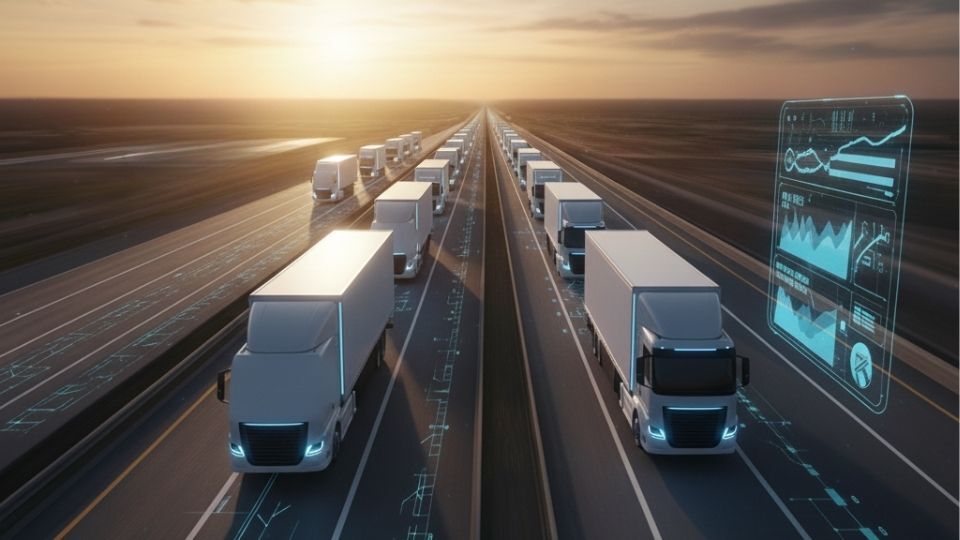Fleet Electrification: Time to Step Up For the Benefit of All!
Connectivity is the key to EV planning and greener fleets.

Sep 6, 2024

All over the world, companies need to comply with a growing number of guidelines designed to reduce their carbon footprint and CO2 emissions. With fleet operations being one of the most polluting activities, fleet managers are at the heart of these discussions. As we approach World EV Day on September 9th, let's take a closer look at market developments and opportunities.
Out with the excuses
How do you maintain a high level of performance while reducing your environmental footprint? A question to which many companies and fleet managers still reply that it's impossible, still holding back to switch to electric vehicles.
A few years back, this fear was still legitimate: the price of electric vehicles was very high, their range fairly short, and the issue of charge was a real challenge, with few charging points available on urban and road infrastructures.
Today, technological breakthroughs and government initiatives are supporting companies, and individuals alike, in their efforts towards sustainable mobility. In France, more than 100,000 public charging points have been deployed, spread across the country to ensure optimum coverage. This number continues to grow as advances are made in super-charging, the ultra-fast charging points that will make a huge difference in the near future.
Also, many connectivity solutions are now available on the market to alleviate these concerns, providing fleet managers invaluable data and data insights for an efficient use of electric vehicles and a successful transition to low-carbon alternatives.
Connectivity: the key to greener fleets
Because ‘you can only manage what you can measure’, it is crucial for companies planning to go electric to connect their vehicles. This is where telematics comes in: companies and managers can access a vast amount of data and data insights regarding their fleet, enabling them to make better decisions.
Firstly, telematics can provide information on the use and performance of each vehicle in a fleet - information that managers can use to decide which vehicles can become electric, without changing their day-to-day use. In this specific case, telematics can estimate the efficiencies realized by the company after the transition, and some technologies can also use the data collected to suggest the most suitable electric replacement models.
In addition, telematics is essential for optimizing the day-to-day management of electric vehicles. The data collected by the vehicles' connected device enables managers to effectively plan their charging times, and to optimize their itineraries and periods of use.
Progressive adoption is the key to success
In the case of France, the government has solely adopted preventive measures to encourage fleet managers to gradually switch to electric vehicles, with a target of 70% of vehicles in a fleet being replaced by electric vehicles by 2030. So far, less than half of French fleets are meeting these quotas.
However, environmental concerns are growing worldwide, and the chances that these recommendations become mandatory in the coming months are very high. Fleets would then be exposed to fines if they don't comply with the directives before the deadline.
This is why the progressive adoption of electric vehicles is a necessity, and to facilitate the transition, it is always preferable to plan ahead. Companies should start their transition as soon as possible to meet the targets set by the government on time, without having to renew a large part of their fleet in a hurry, once the law becomes restrictive.
Conclusion
Today, with the availability of tools such as telematics, the fear of breakdown is no longer an excuse to postpone the transition to electric vehicles. There are an increasing number of charging stations, and the downtime required to completely charge a vehicle is getting shorter and shorter. Telematics solutions available on the market also enable companies to predict and anticipate the vehicle's charging needs and maintenance, ensuring a higher level of operational efficiency while considerably reducing their CO2 emissions.
Subscribe to get industry tips and insights

Managing Director of Geotab France since April 2021, François Denis has over 25 years' experience in the automotive industry. He is an expert in the sectors of connected vehicles, telematics and car-sharing. François also has a thorough grasp of current mobility issues, such as the implementation of the LEZ and the LOM law.
Table of Contents
Subscribe to get industry tips and insights
Related posts

Run on Less data redefines electric truck viability
December 17, 2025
4 minute read
.png)
From the North Pole to the Highway: How AI and Predictive Insights Get Drivers Home for the Holidays
December 16, 2025
2 minute read


Elevating Worker Safety Through Simplicity: The OK Alone Story
December 3, 2025
2 minute read

The $4B Crisis: Video Intelligence as the Answer to Fleet Distraction
December 2, 2025
3 minute read

The True Cost of Cargo Theft: When Customer Trust is on the Line
November 24, 2025
2 minute read